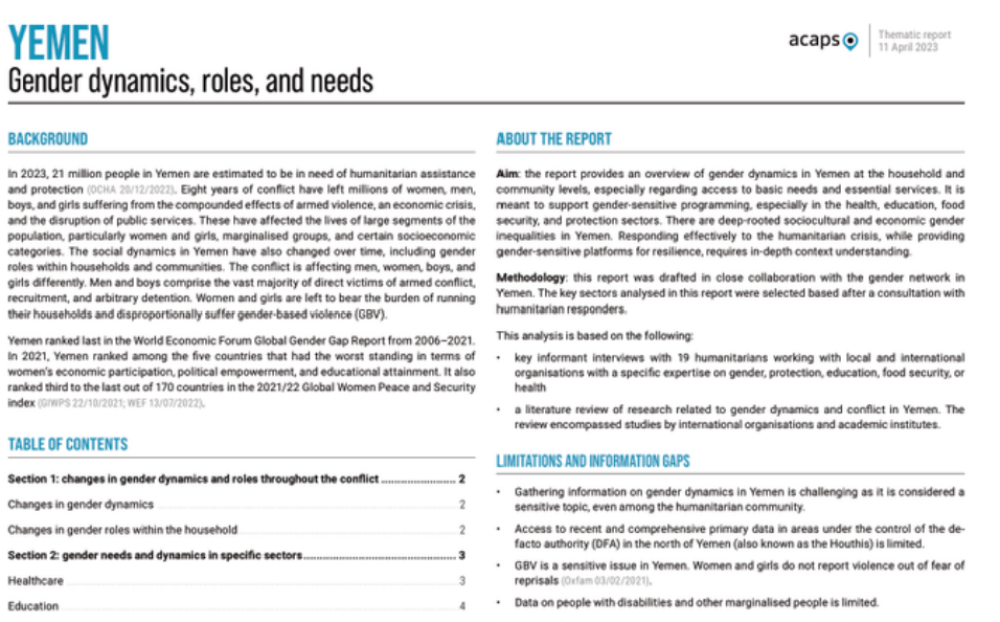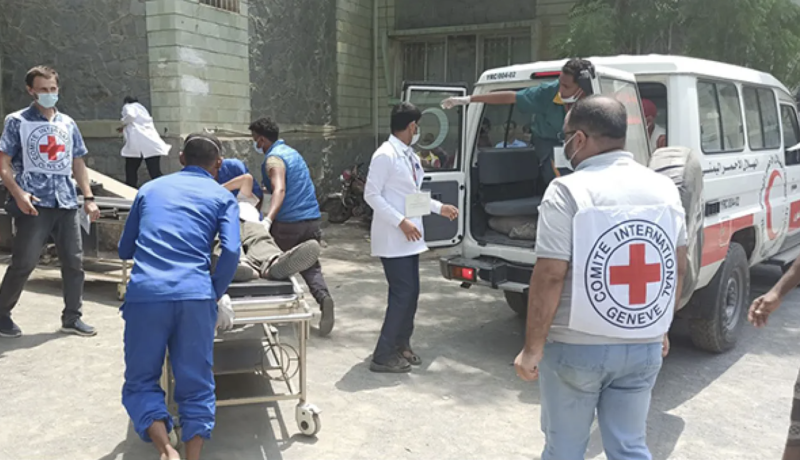ACAPS Thematic Report - Yemen: Understanding the cycle of gender-based violence


OVERVIEW
Yemen is considered one of the worst humanitarian crises in the world and is characterised by significant protection threats (CFR accessed 23/07/2023). Gender-based violence (GBV) is a major issue nationwide, and Yemen has consistently ranked last or second to last in the World Economic Forum’s Global Gender Gap Index. In 2017, Yemen was listed as the worst place in the world to be a woman (WEF 02/03/2021; IRC 25/02/2019). It is important to note that GBV is also both a human rights issue and a public health issue. Despite this, as at October 2023, the GBV area of responsibility remained underfunded, and only 31% of the entire Yemen Humanitarian Response Plan was funded (UNHCR 31/10/2023). Not only is GBV less prioritised than some other forms of humanitarian assistance, but many responders are also less interested in implementing GBV interventions because of the risks and difficulties associated (KII 21/08/2023).
The current conflict has lasted for nearly a decade, aggravating existing gender inequality, affecting access to economic activities and basic services, and reportedly contributing to an increase in GBV incidents (USAID/Banyan Global 30/01/2020; IRC 25/02/2019). The common consensus is that instability, the collapsing legal system, insufficient protection and GBV response systems, inequitable gender norms, and the use of GBV by warring parties to consolidate and maintain control have all aggravated GBV risks. This is not unique to Yemen; the link between increased GBV risk and conflict is well documented (IRC 25/02/2019).
GBV in Yemen is not new. Yemen’s sociocultural and legal systems are built on deep-rooted gender inequalities, as evidenced by the Mahram (male guardian) requirement. This, coupled with the conflict, means all women and girls in Yemen are at risk of GBV. Because of GBV’s many forms – physical, verbal, psychological, sexual, and socioeconomic – it can manifest differently, including as homicide, so-called ‘honour’ killings, rape, forced marriage (including early marriage), the gendered denial of inheritance rights, movement restrictions, and reduced access to education based on gender.
Timely, reliable, and comparable GBV data in Yemen is difficult to access and unlikely to reflect the full extent of GBV due to significant underreporting. The available literature, anecdotal evidence, and experiences of both national and international responders all point to an increase in reported GBV incidents and risks (SCSS 15/12/2019; ACAPS 11/04/2023). Bureaucratic and administrative barriers impede the implementation of GBV programming in many areas; humanitarians must rename or adjust GBV interventions to receive approval, which, combined with the Mahram requirement, makes the tracking of GBV programming outcomes extremely challenging (ACAPS 22/11/2022).

Aden – The Combined Maritime Forces (CMF) announced Tuesday the seizure of a new shipment of illicit narcotics valued at more than $142 milli…

Geneva – United Nations High Commissioner for Human Rights Volker Türk has renewed his urgent appeal for the immediate and unconditional…

Geneva — The International Committee of the Red Cross (ICRC) has welcomed the preliminary agreement reached between Yemen’s warring par…